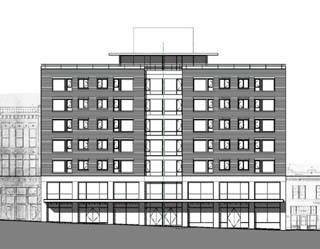Low Income Housing Institute
Specialty: Low-income housing
Management: Sharon Lee, Cindy Proctor, Trent Larsen, Brian Sweeney
Year founded: 1991
Largest current project: Belltown View, Seattle

Image by Weinstein A|U
LIHI’s $16.5 million Belltown View project will include 46 units of low-income housing, along with offices and commercial space. |
The Low Income Housing Institute owns 44 properties and manages 1,400 residential units. Executive Director Sharon Lee estimated the nonprofit has developed over 2,600 units since its inception in 1991. Much of that, it seems, was completed in the past couple years. When asked for a rundown of recent projects, Lee reeled off a long list.
Top projects include: Tyree Scott Apartments, 21 units in Rainier Valley for low-income refugee and immigrant families; Cedarwood II Apartments, 40 preserved Section 8 units in Lake Stevens; Martin Court, 42 renovated units of transitional housing in Georgetown; 1811 Eastlake Ave., 75 units of supportive housing; Cabrini Senior Housing, 50 units on First Hill; and Denny Park Apartments, 50 units of workforce housing in South Lake Union.
Lee referred to LIHI’s Belltown View development as its flagship project. The $16.5 million building, near First Avenue and Wall Street, will include 46 housing units, the Belltown Neighborhood Center, a housing resource center, street-level commercial space and offices for LIHI.
|
Lee |
All the development and preservation activity goes hand-in-hand with terrific need — the National Low Income Housing Coalition estimates that 46 percent of King County renters can’t afford a two-bedroom apartment at fair-market value. More than 9,000 households in King County are homeless.
“We’ve seen an incredible increase in the need for affordable housing,” Lee said. “Many (people) are actually working, but their pay is too low.”
Sixty percent of those who use an urban rest stop the institute operates have jobs, Lee said, “but they’re living in a shelter, tent city or they’re homeless.”
Rising property values in Seattle, particularly in South Lake Union, are also putting pressure on affordable housing.
“We’re very concerned the city and business community has targeted South Lake Union for rapid growth,” Lee said. “We’re concerned we won’t be able to support the existing affordable housing that’s there.” Fewer affordable sites also make development more difficult.
“We’re competing as a nonprofit with for-profit developers,” Lee said.
“We are so grateful to the citizens of Seattle who voted for the ($86 million) housing levy,” she added. “We would be in even deeper trouble without it.”